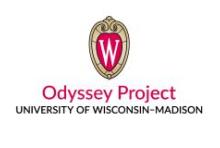The UW Odyssey Project offers free University of Wisconsin-Madison humanities classes for adult students facing economic barriers to college. Now celebrating its 20th year, Odyssey has empowered more than 600 low-income adults to find their voices and get a jump start at earning college degrees they never thought possible. Some graduates of the program have journeyed from homelessness to UW-Madison degrees, or from incarceration to meaningful work in the community.
In this ... Read More
The UW Odyssey Project offers free University of Wisconsin-Madison humanities classes for adult students facing economic barriers to college. Now celebrating its 20th year, Odyssey has empowered more than 600 low-income adults to find their voices and get a jump start at earning college degrees they never thought possible. Some graduates of the program have journeyed from homelessness to UW-Madison degrees, or from incarceration to meaningful work in the community.
In this six-credit English literature course, UW-Madison faculty members introduce adults to great works of literature, philosophy, history, and art and help them improve skills in writing and critical thinking. In class, students read, write about, and engage in lively discussions of Emily Dickinson, Martin Luther King, Walt Whitman, Shakespeare, Lorraine Hansberry, and more.
The UW Odyssey Project has four main programs: the Odyssey Course (current adult students), Odyssey Junior (enrichment program for children and grandchildren of Odyssey students and alumni), Onward Odyssey (additional courses for Odyssey alumni), and Odyssey Beyond Bars (credit and non-credit courses for incarcerated learners). In the Fall of 2023, we will be launching Odyssey Beyond Wars, humanities programming for veterans.
The majority of students that participate in the Odyssey Course are from racial and ethnic minority groups (~90%) and are often overcoming the obstacles of single parenthood, homelessness, drug and alcohol addiction, incarceration, depression, and domestic abuse. Odyssey students report transformative outcomes for themselves and their families. They read more to their children, feel that they are better parents and advocates for their children in school, have more hope about their own futures, and are more likely to vote and become involved in their communities.
Hide Full Text